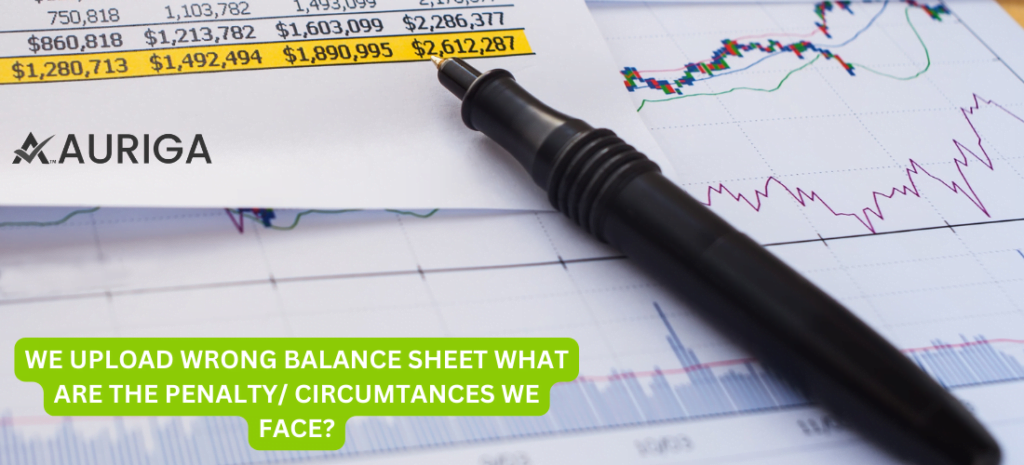WE UPLOAD WRONG BALANCE SHEET, WHAT ARE THE PENALTY/ CIRCUMTANCES WE FACE?
Introduction
Toggle
WE UPLOAD WRONG BALANCE SHEET, WHAT ARE THE PENALTY/ CIRCUMTANCES WE FACE?
INTRODUCTION
A balance sheet is a financial statement that summarizes a company’s assets, liabilities, and shareholders’ equity at a specific point in time. It is one of the three main financial statements, along with the income statement and the cash flow statement.
We are upload a wrong balance sheet in ROC, you may face the following penalties/circumstances
- Fines – The ROC can impose fines on companies that fail to file accurate balance sheets. The amount of the fine will depend on the severity of the error.
- Suspension or dissolution – If the ROC finds that your company has repeatedly filed wrong balance sheets, it may suspend or dissolve your company. This would mean that your company would no longer be able to operate.
- Barring from forming a new company – If the ROC finds that you have deliberately filed a wrong balance sheet, you may be barred from forming a new company in the future. This would make it difficult for you to start a new business.
- Legal action – The ROC can take legal action against companies that file wrong balance sheets. This could result in fines, imprisonment, or other penalties.
- It is important to note that these are just some of the potential penalties/circumstances that you may face if you upload a wrong balance sheet in ROC. The specific consequences that you may face will depend on the specific circumstances of your case.
If you are unsure of what to do if you have uploaded a wrong balance sheet in ROC, you should consult with a lawyer or a chartered accountant. They can help you to assess the situation and determine the best course of action.
HERE ARE SOME TIPS TO AVOID THE PENALTIES/CIRCUMSTANCES OF UPLOADING A WRONG BALANCE SHEET IN ROC:
- Make sure that you check the balance sheet carefully before you file it with the ROC. This will help to avoid errors in the first place.
- If you do make an error, correct it as soon as possible. The sooner you correct the error, the less likely you are to incur penalties.
- Get help from a lawyer or a chartered accountant if you are not sure how to correct the error. They can help you to navigate the process and avoid making any further mistakes.
- Be transparent with your stakeholders about the error and the steps you are taking to correct it. This will help to mitigate the damage to your company’s reputation.
DISADVANTAGES
Uploading a wrong balance sheet in ROC can have several disadvantages, including:
- Financial penalties – The ROC can impose fines on companies that file wrong balance sheets. The amount of the fine will depend on the severity of the error.
- Legal action – The ROC can take legal action against companies that file wrong balance sheets. This could result in fines, imprisonment, or other penalties.
- Damage to reputation – If your company is found to have filed a wrong balance sheet, it can damage your company’s reputation. This could make it difficult to attract investors or customers.
- Suspension or dissolution – If the ROC finds that your company has repeatedly filed wrong balance sheets, it may suspend or dissolve your company. This would mean that your company would no longer be able to operate.
- Barring from forming a new company – If the ROC finds that you have deliberately filed a wrong balance sheet, you may be barred from forming a new company in the future. This would make it difficult for you to start a new business.
CONCLUSION
To conclude, uploading a wrong balance sheet in ROC can have several disadvantages, including financial penalties, legal action, damage to reputation, suspension or dissolution, and barring from forming a new company. The specific penalties/circumstances that you may face will depend on the specific circumstances of your case. If you are unsure of what to do if you have uploaded a wrong balance sheet in ROC, you should consult with a lawyer or a chartered accountant. They can help you to assess the situation and determine the best course of action.



